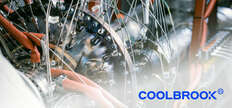- Coolbrook's RotoDynamic Reactor successfully cracks 100% plastic-waste-derived pyrolysis oil.
- The process yields high ethylene and propylene without needing fossil feedstock dilution.
- The eLECTRO project, funded by EU Horizon Europe, supports this development.
- Coolbrook's technology aims to enhance sustainable olefin production from end-of-life plastics.

Breakthrough in Pyrolysis Oil Cracking
Coolbrook has achieved a significant milestone by successfully cracking 100% plastic-waste-derived pyrolysis oil at its large-scale pilot facility using the RotoDynamic Reactor (RDR) technology. This marks the first time globally that such a process has been accomplished, maintaining high yields of ethylene and propylene while ensuring stable operations.
Advancing Circular Plastics
Pyrolysis oil from waste is crucial for closing the loop in plastics recycling. Coolbrook's success demonstrates the RDR's capability to handle challenging feedstocks, paving the way for sustainable olefin production from end-of-life plastics. This achievement builds on previous successes at the Brightlands pilot plant in the Netherlands, where Coolbrook demonstrated the ability to heat various gases using renewable electricity.
eLECTRO Project Support
The tests were part of the eLECTRO project, funded under the EU Horizon Europe programme, which aims to develop an electrified pathway for converting mixed plastic waste into light olefins. The project combines advanced waste pre-treatment, electrified pyrolysis, and electrified cracking via Coolbrook’s RDR, aiming to demonstrate sustainable, circular, and scalable solutions for the future of plastics and petrochemicals.
Implications for the Petrochemical Industry
Dr. Tuomas Ouni, Head of Process Development at Coolbrook, highlighted the benefits of cracking 100% pyrolysis oil without dilution, which simplifies operations and enhances traceability of circular materials. The RDR technology offers improved yields of ethylene and propylene compared to conventional furnaces, without increasing coking, confirming its potential role in decarbonization and circularity within the petrochemical industry.

